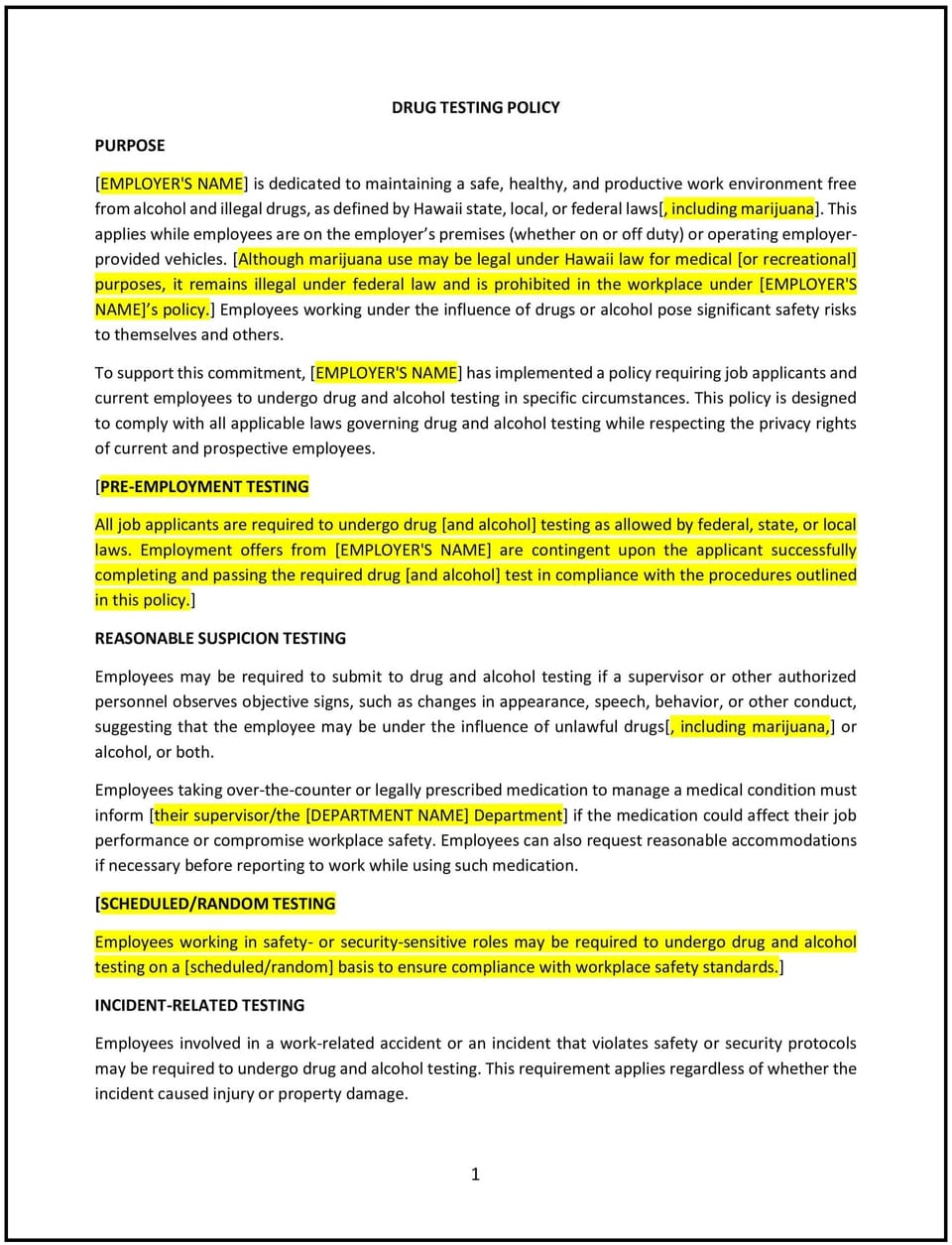Drug testing policy (Hawaii): Free templates

Drug testing policy (Hawaiʻi)
A drug testing policy helps Hawaiʻi businesses establish guidelines for testing employees for substance use in a manner that balances workplace safety, employee privacy, and legal requirements. This policy outlines the circumstances under which drug testing may occur, the procedures for conducting tests, and the consequences of positive results, while addressing Hawaiʻi-specific laws and cultural considerations. It is designed to promote a safe and productive work environment while respecting employees’ rights.
By implementing this policy, businesses in Hawaiʻi can reduce workplace risks, maintain compliance with state laws, and demonstrate a commitment to employee well-being and safety.
How to use this drug testing policy (Hawaiʻi)
- Define testing circumstances: Specify when drug testing may occur, such as pre-employment, post-accident, reasonable suspicion, or random testing, in compliance with Hawaiʻi laws.
- Establish testing procedures: Outline the steps for conducting drug tests, including the types of tests used, collection methods, and chain-of-custody protocols.
- Address employee rights: Ensure the policy respects employees’ privacy and confidentiality, and provide information about their rights during the testing process.
- Specify consequences: Clearly state the consequences of a positive test result, such as disciplinary action, rehabilitation options, or termination, depending on the circumstances.
- Communicate the policy: Share the policy with employees during onboarding and through internal communications to ensure awareness and understanding.
- Train managers: Educate supervisors on how to identify signs of substance use, handle testing procedures, and enforce the policy consistently.
- Monitor compliance: Regularly review testing practices to ensure adherence to the policy and address any issues promptly.
- Review and update the policy: Regularly assess the policy’s effectiveness and make adjustments as needed to reflect changes in laws, workplace dynamics, or business needs.
Benefits of using this drug testing policy (Hawaiʻi)
This policy offers several advantages for Hawaiʻi businesses:
- Promotes workplace safety: Reducing substance use in the workplace helps prevent accidents and injuries.
- Protects business interests: A clear policy minimizes legal risks and potential liability related to workplace incidents.
- Supports employee well-being: Offering rehabilitation options demonstrates a commitment to helping employees overcome substance use issues.
- Enhances productivity: A drug-free workplace fosters a focused and efficient work environment.
- Aligns with legal requirements: The policy helps businesses comply with Hawaiʻi state laws and federal regulations regarding drug testing.
- Encourages accountability: Employees understand the expectations and consequences related to substance use in the workplace.
- Builds trust: A fair and transparent policy demonstrates respect for employees’ rights and privacy.
Tips for using this drug testing policy (Hawaiʻi)
- Communicate the policy effectively: Share the policy with employees during onboarding and through regular reminders, such as emails or training sessions.
- Provide training: Educate employees and managers on the policy’s guidelines, including testing procedures and employee rights.
- Be consistent: Enforce the policy uniformly to avoid perceptions of favoritism or bias.
- Respect privacy: Ensure drug testing procedures protect employees’ confidentiality and dignity.
- Offer support: Provide resources or assistance programs for employees struggling with substance use issues.
- Monitor compliance: Regularly review testing practices to ensure adherence to the policy and address any issues promptly.
- Review the policy periodically: Update the policy as needed to reflect changes in laws, workplace dynamics, or business needs.
Q: Why should Hawaiʻi businesses adopt a drug testing policy?
A: Businesses should adopt this policy to promote workplace safety, reduce legal risks, and support employee well-being.
Q: When can drug testing occur?
A: Drug testing may occur under specific circumstances, such as pre-employment, post-accident, reasonable suspicion, or random testing, in compliance with Hawaiʻi laws.
Q: What procedures should businesses follow for drug testing?
A: Businesses should outline steps for conducting tests, including the types of tests used, collection methods, and chain-of-custody protocols.
Q: How should businesses handle employee rights during testing?
A: Businesses should respect employees’ privacy and confidentiality and provide information about their rights during the testing process.
Q: What are the consequences of a positive test result?
A: Consequences may include disciplinary action, rehabilitation options, or termination, depending on the circumstances and the policy’s guidelines.
Q: What training should businesses provide to employees and managers?
A: Businesses should educate employees on the policy’s guidelines and train managers on identifying signs of substance use and handling testing procedures.
Q: How often should the policy be reviewed?
A: The policy should be reviewed annually or as needed to reflect changes in laws, workplace dynamics, or business needs.
This article contains general legal information and does not contain legal advice. Cobrief is not a law firm or a substitute for an attorney or law firm. The law is complex and changes often. For legal advice, please ask a lawyer.


